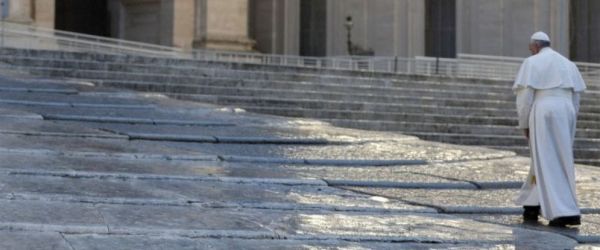The parable in this Sunday’s Gospel passage (cf. Lk 16:1-13) has as its protagonist a sly and dishonest steward who, charged with wasting his master’s goods, is about to be dismissed. In this difficult situation, he does not complain; he does not seek justifications nor does he allow himself to become discouraged, but thinks of a way out in order to ensure himself a calm future. He initially reacts with clarity of mind, recognizing his own limitations: “I am not strong enough to dig, and I am ashamed to beg” (v. 3); then he acts shrewdly, robbing his master for the last time. In fact, he calls the debtors and reduces the debts they owe to the master, in order to make them friends and to be repaid by them later. This is to make friends through corruption and obtaining gratitude through corruption, as sadly is common practice today.
Jesus presents this example certainly not to encourage dishonesty, but prudence. Indeed he emphasizes: “The master commended the dishonest steward for his prudence” (v. 8), that is, for that combination of intelligence and cunning, which enables one to overcome difficult situations. The key to reading this narrative lies in Jesus’ invitation at the end of the parable: “make friends for yourselves by means of unrighteous mammon, so that when it fails they may receive you into the eternal habitations” (v. 9).
This seems somewhat confusing, but it is not so: the “unrighteous mammon” is money — also called “devil’s dung” — and in general material goods.
Wealth can propel one to build walls, create division and discrimination. Jesus, on the contrary, encourages his disciples to reverse course: “Make friends for yourselves by means of mammon”. It is an invitation to know how to change goods and wealth into relationships, because people are worth more than things, and count more than the wealth they possess. Indeed, in life, it is not those who have many riches who bear fruit, but those who create and keep alive many bonds, many relationships, many friendships through a variety of “mammon”, that is, the different gifts that God has given them. But Jesus also points to the ultimate aim of his exhortation: “Make friends for yourselves by means of mammon so that they may receive you into the eternal habitations”. If we are able to transform wealth into tools of fraternity and solidarity, not only will God be there to welcome us into heaven, but also those with whom we have shared, properly stewarded what the Lord has placed in our hands.
Brothers and sisters, this Gospel passage makes the question of the dishonest steward dismissed by his master, resonate in us: “What shall I do now?” (cf. v. 3). In facing our shortcomings and our failures, Jesus assures us that we are always in time to put right with good the harm done. Those who have caused tears, make someone happy; those who have wrongfully taken, give to those who are in need. By doing so, we will be commended by the Lord “because we have acted with prudence”, that is, with the wisdom of those who recognize themselves as children of God and challenge themselves for the Kingdom of Heaven.
May the Blessed Virgin help us to be prudent by assuring ourselves not worldly success but eternal life, so that at the moment of the final judgement, the needy people whom we have helped can testify that in them we saw and served the Lord.
[Pope Francis, Angelus, 22 September 2019]












